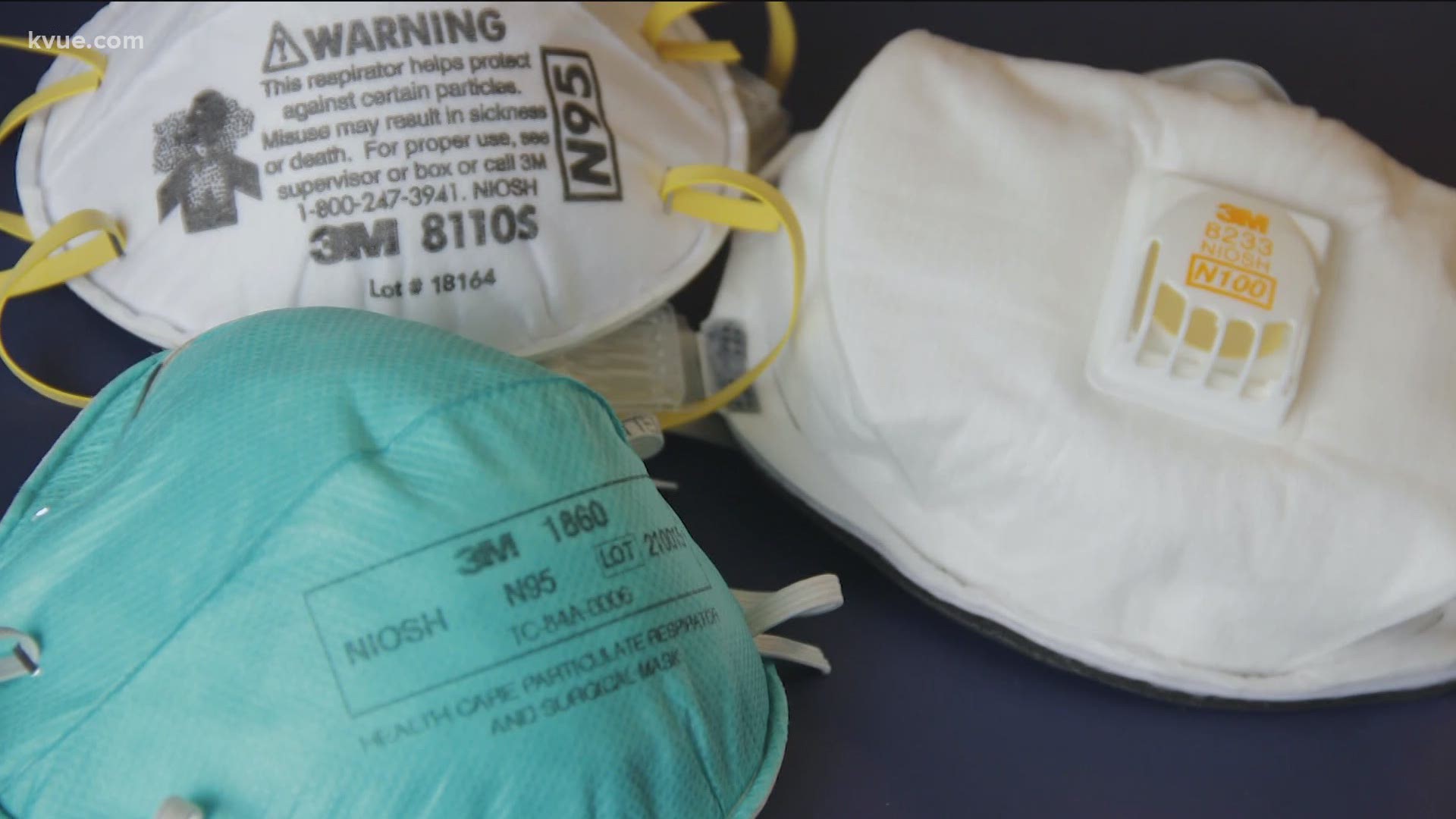AUSTIN, Texas — Austin is now in Stage 4 of its COVID-19 risk-based guidelines, and Mayor Steve Adler is yet again urging people to wear masks.
"On our current path, more people are going to get sick and are going to die ... and [it] would happen if we don't wear face coverings and maintain 6-foot distancing," he said.
Here's why Adler and health experts agree wearing a mask is important: The cloth masks and surgical masks some of us are using only work if everyone around us is wearing one, too.
RELATED: City of Austin 'Stay Home, Work Safe' order extended to Aug. 15 after surge in hospitalizations
According to the CDC, these types of masks may help prevent the spread of COVID-19 if the person wearing them is sick or asymptomatic. They help stop germs from spreading when you talk, cough or sneeze.
But if no one around you is wearing a mask, your cloth or surgical masks won't really protect you if those mask-less people are infected, according to the CDC. They're just simply not made that way.
That's why medical professionals wear those N95 masks. The CDC reports they help filter out 95% of the particles in the air.
So, why can't the general public get their hands on those N95 masks? Probably because you can't find them easily. They're still out of stock in stores like Home Depot and Lowe's – even Amazon.
The manufacturers send them to hospitals and first responders first, so most consumers can't access them.
Dr. Edward Anderson, a Wright Centennial Professor for Management of Innovative Technology at UT Austin's McCombs School of Business, told KVUE the shortage of N95 masks happened because a lot of countries initially banned exports of their masks to the U.S., and they had the bulk of the capacity that we were actually consuming.
"The reason is ... we don't have enough capacity to produce because the machines to make them are really highly specialized. It's not like sewing fabric. You actually have to make this filter material. And to make a new machine takes something on the order of nine to 12 months for delivery time, normally, and, realistically, can only be probably crashed to about six months," he said.
As a result, it may be a while before N95 masks reappear on store shelves.
"I hate to say this because it's dependent upon the amount of equipment, and that takes a while ... the increases we are talking about. So, we're looking at probably at least three to four months," Dr. Anderson said.
Until those masks are available for everybody, the cloth masks and surgical masks can only work if everyone wears them.
On Tuesday, epidemiologist Elizabeth Matsui, M.D., with the Dell Med School at the University of Texas, debunked the following myths:
Myth #1: Masks Aren’t Necessary
Even though mask-wearing wasn’t advised in the early weeks of the pandemic, Matsui said the guidance changed when we learned more about how coronavirus is spread. Cloth masks act a physical barrier to keep viral droplets from circulating in the air, where people can breathe them in and become infected.
“Because of science, we've learned two things about the virus,” said Matsui. “The first that we've learned is that people who are asymptomatic can spread the virus. The second thing that we've learned is that just breathing, talking, shouting and singing actually emit virus into the air and that the infection can be spread that way.”
Myth #2: I Don’t Need a Face Covering if I’m Not Sick
Matsui said wearing a mask absolutely helps people who don’t have the virus, by providing a layer of protection — most effective when combined with physical distancing. Wearing a face covering also makes it harder to touch your nose and mouth, which is another way the virus gets into the body.
“The other way that it helps you is if you wear a mask it sends a message to people around you to also wear a mask and that it is the appropriate thing to do,” said Matsui. “And the more people who are wearing masks, the lower the infection rate will be in our community.”
Myth #3: Social Distancing is Unnecessary if I’m Wearing a Mask
Face coverings are just one factor in preventing the spread of COVID-19. While helpful, cloth masks don’t provide full protection against the virus, especially if someone coughs or sneezes near you.
“The further away you are from the person, the less likely you are to be exposed to a large amount of virus,” said Matsui.
MORE CORONAVIRUS COVERAGE:
- Austin-Travis County health officials alarmed at growing number of COVID-19 hospitalizations
- New initiative aims to help Austin small businesses expand operations through mid-December
- Austin airport considering internal delivery service for terminal restaurants, shops
- Class of 2020: Austin ISD hosts virtual commencement ceremonies
- Texas health officials repeal emergency rules for child care providers

